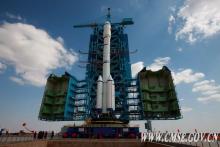China Takes Up Scepter Of Manned Space Flight
China's space program is blossoming just as Russia's wilts and the Unites States abandons their own.
With today's launch of China's Tiangong 1 ("Heavenly Palace") unmanned spacecraft, China places another arrow in its quiver of global competition. The Chinese government has been aggressively pursuing a number of high-profile national initiatives, including a network of high-speed rail, greatly increased global presence in the solar energy market, and a plan to build their own space station. The Tiangong 1 is the first in a several stage process that will ultimately leave China with a fully functioning, and solely supported space station to rival the now nearly a decade old international space station run jointly by the U.S., Russia, and several other countries. This move comes at a time when the U.S. has closed its publicly funded manned-space travel program with NASA, moving more towards a privatized model. Russia's program, likewise, has seen a number of recent setbacks with equipment failures and glitches. As this second decade progresses, we may see further emergence of China as a leader in space science and technology.
